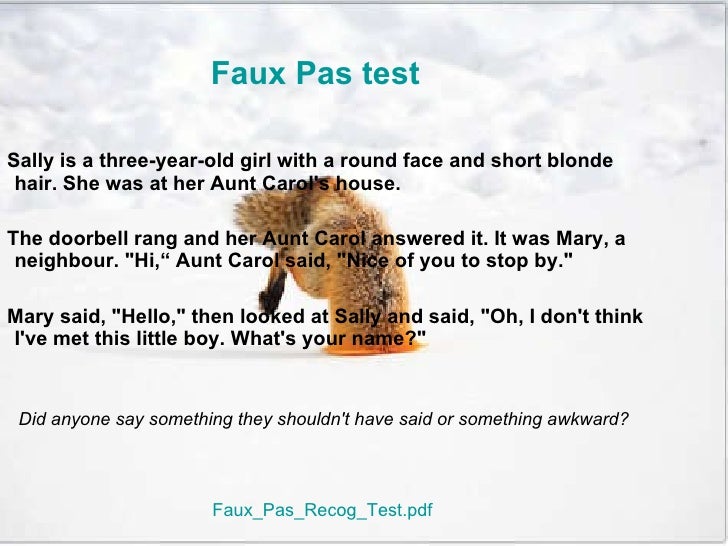

Having this granular linguistic targeting within your account is important as the search could be coming from any one of these languages and you’ll want to capture your audience using a language they understand. However, it’s also important not to neglect Polish as it’s the second most spoken language in this market. Take for example the UK, where you might think to only target English as it is the official language of the country. Not only is it important to target the dominant language in each market, but delve a bit deeper and adapt to other languages. This part seems the most obvious but is often overlooked. This will prevent a natural reading flow – and most likely prevent any potential clicks too. We’ve seen countless examples where ad copy has been a word-for-word translation without any consideration of the sentence structure or local nuances.
#Faux pas example sentences how to#
Here we take a look at four common international marketing faux pas – and how to avoid them when launching activity in a new market. Unfortunately, this isn’t always plain sailing and there are a few simple mistakes that can easily be avoided. It makes sense that what you are doing in one country in regards to your marketing translates well into another market, just like any language would. Give us some examples of any concise and compact sentences you have used recently that saved you the breath you would have used, had you been speaking the long-winded and verbose language of English.When you build your global business, you want to ensure that all of your PPC digital marketing efforts follow suit. (Chūmén bié wàng dài wǒ de yàoshi hé wàitào). (Nǐ yào chūmén de shíhòu, bié wàng shùnbiàn bǎ wǒ de yàoshi hé wǒ de wàitào dài guòlái). "When you leave the house don't forget to bring my keys and my jacket with you." (Wǒ yǒudiǎn er lèi, xiǎng huí jiā xiūxí yīxià).

"I'm feeling a bit tired so I'd like to go home and rest for a while." (Yī dào chāoshì jiù wàngle yāomǎi shénme). (Wǒ yī dào chāoshì jiù wàngle wǒ yīnggāi mǎi shénme dōngxī). "When I got to the supermarket I forgot what I needed to buy." Who knows why brevity is so attractive in Chinese? Perhaps paper was expensive back in the day, or maybe they just had better things to get on with – either way, it is clear that long-winded fools are not suffered gladly.īack to everyday speech, let's put our newfound knowledge into action and practice chipping away at some sentences: If you are worrying about how far is too far when pruning your Chinese, Chéngyǔ's are proof that you can't really go too far. When you enter a new place, its best to follow the local customs and culture, or, "When in Rome, do as the Romans do." Here, 入 (rù) means 'to enter' 乡村 (xiāngcūn) a village 随 (suí) to follow, and 风俗 (fēngsú) customs and habits. The art is to take a proverb and condense it to its most condensed form (usually only 4 characters long) – so much so that it can be often hard to guess what it means after all those unnecessary frills have been trimmed. This is often how 成 语( Chéngyǔ/Chinese idioms) are formed. "I want to go to Beijing University or Xiamen University." I mean, who wants to use 4 syllables when you can use two? This can be confusing if you have not seen the full-length version before as you will be wondering what it is at "North Big" that everyone is going to see.Įven conjunctions such as 或者 (huòzhě/ or) can be shortened: It is quite common to drop the second character of two-character words, especially with names.īeijing University 北京大学 (Běijīng Dàxué) is often shortened to only two characters: 北大(Běi Dà). What you only really need: 明天再说吧。(Míngtiān zàishuō ba.)Ģ) Express double-character words as singles:

What you only really need: 要不要去看电影?(Yào bùyào qù kàn diànyǐng?) Whenever it is obvious who you are talking to/about, just give the pronoun the boot. Continuing on from the last article, where we dealt with the tempting trap of adding too many articles and too many '的's to your Chinese sentences, this article will look at how to whittle your sentences down to sheer succinct masterpieces, just like a real native speaker.Chinese is great because it lets you cut out all the niceties and accessories and just say what you need to say.


 0 kommentar(er)
0 kommentar(er)
